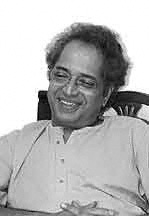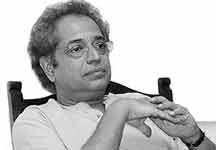- Home
- Archive -Nov 1998
- I AM FOR THE ER. . .

I AM FOR THE EROTIC
- In :
- Others
By Life Positive
November 1998
He has been an engineer, an economist and a teacher. Now he claims he is completing the unlived part of his life with his first novel, The Ascetic of Desire. One of the few practicing psychoanalysts in India, Dr Sudhir Kakar is better known for his non-fictional works on psychoanalysis, Indian sexuality and indigenous healing traditions. His latest work is a fictional account of the life of Vatsyayana, author of ancient India’s sexual treatise Kamasutra.
 |
Set in the opulent Gupta period, it covers a wide range of subjects on Indian erotica-from incest, homosexuality and infidelity to food, trade and exorcists. In an interview in New Delhi with Arundhati Mitra, the soft-spoken, unassuming scholar speaks about his work and interests. Psychotherapy and spirituality are converging, each being enriched by the other.
What made you choose Vatsyayana’s life as the theme for your novel?
A psychoanalyst is also a theoretician of sexual desires. Vatsyayana’s association with erotica made him a natural choice for me. I was fascinated by the mystery surrounding his life. Very little is known about him. This gave a much fuller rein to my imagination. Besides, I thought this would be a nice opportunity to interplay Vatsyayana’s ancient sexuality with modern theories. Kamasutrawas just a peg for meditation on eroticism.
So you wanted to make a comparative study of ancient and modern sexuality?
No, not a study really. Kamasutra is familiar. So is sexuality. How do you make it unfamiliar again? You can either go into ethnography of a tribe that does very different things or into a time in history, where it was all very different and start questioning what sexuality or sexual desire is. I chose an ancient time to make that which is familiar somewhat more puzzling, a bit unfamiliar again.
How much of the psychoanalyst influenced the novelist?
As much as the novelist has influenced the psychoanalyst in the previous writings. You always write what you have experienced. If I wrote a book on the basis of my theoretical readings, it would be mechanical. My personal experiences add life to my writings.
What is the basic message of Kamasutra?
To give eroticism a greater place in the scheme of life along with artha, moksha and so on. But it does not imply libertinism. Kamasutra has a lot of dharma (of sexuality) and dharma leads to spirituality. It tells you that there are certain things you should not do but if you want to do it then do it this way. It’s the Indian way of saying that nothing is absolutely right or wrong. That way it professes some subordination to the whole scheme of the person and is not independent of him.
Was sex always a taboo in India?
Actually, there are two factors here. First, there is the Indian tradition itself where there is a conflict between the ideals of eroticism and ascetic celibacy. A conflict which eroticism has almost always lost, except in the Gupta period of Vatsyayana. Which is why I selected this period for the book. I’m for the erotic rather than the celibate. Secondly, the middle class was under the Victorian Puritanical influence, which strengthened the ascetic ideals of the Indian tradition. People believed that since the western political and economic institutions were better, perhaps their moral institutions were also better.
Is the ascetic tradition responsible for the prevailing attitude towards erotica?
I think that has much to do with it. I don’t know whether history, or rather reported history, is true. All the great ascetics with exceptions of course, tirade against sexuality. There have been changes as well. Rajneesh (Osho) was certainly one. But that tradition, which was there, has been suppressed.
How different is Freudian concept of sexuality from Kamasutra‘s philosophy?
Eroticism in Freud is much more of the mind. Kamasutra has much more to do the body—what pleases it and what doesn’t.
How different is the western concept of erotica from its eastern counterpart?
There is really no single western concept. (Pauses) Well, Freudianism is one. Then there is the western sexology. The whole Masters-Johnsonian era, which is very similar to the Kamasutra. This (Freud) would be a little different. I think the western kind has greater independence from morality, unlike India. Here morality and sexuality are fused together.
Do you think that now there is a shift in focus vis-à-vis morality?
There is a change coming. At present, the middle class is the vehicle of this change. It is moving towards the western concept that talks of a sexuality free from any restraint. But a lot of work is still required to elaborate on a sexual norm for modern India. We should not remove it too far from our own cultural experiences. Otherwise there would again be a divide: on the one side the great ascetic idealism and on the other a completely erotic idealism. It is very difficult to say which direction it is going in.
 |
In India, people would much rather turn to religion than a psychiatrist…
Yes, very much so. The greatest attraction of our religious practices is psychotherapy. People don’t turn to religion for what you call salvation or but mostly to get rid of pain or distress. Your Shamans, Mystics and Doctors dealt with a lot of mumbo-jumbo.
You don’t think such things work?
On the contrary, I do think such things work. If you think that the pain and distress is coming from a source outside yourself, you need healers who share your worldview to stop those forces. But if you believe your problems and distress are coming from inside, then all this won’t work.
Would you recommend a patient to go to such a healer?
Well, the patient who comes to me has already selected the kind of therapy he wants. But many patients do come with a strong belief that their pain is external. In that case, there are two strategies. One is to remind them of their own tradition that all their kam (desire), krodh (anger), lobh (greed), moh (attachment) is internal. Then you can treat them with psychotherapy by changing their worldview from external to internal. Or you send them to a pir, fakir or an exorcist. I have sent patients to such healers when I felt they would be of better help.
Do you practice any of the alternative therapies?
No. Therapy is like music. If you are trained in a particular gharana, you should not mix it with any other.
What role does spirituality play in your work?
Spirituality is entering the field of psychotherapy not as part of the existing schools but as new schools. In my own field, psychoanalysis, however, it does not play any role.
In Psychotherapy—East and West, Alan Watts says that eastern religions are thinly veiled psychotherapy. What do you think?
I agree with him partly. The basic offer of eastern spirituality is psychotherapeutic, a relief from mental distress. True spirituality in the sense of ‘self-realization’ is a much longer road and can only begin after the psychotherapeutic function has been successfully performed.
Increasingly, western psychotherapy is turning to eastern spirituality. How significant will this be in the New Age?
The basic difference between psychotherapy and spirituality revolves around the biography of a person. Spirituality ignores it. It is more teleological and concerned with the future. In psychotherapy, the patient’s past is an important aspect of diagnosis. Actually the West’s fascination with the East is not new. Jung has already discussed it. But they are more interested in exploring the second stage that I talked of earlier, the ‘self-realization’.
What is your next novel about?
(Laughs) I can’t tell you that. It’ll take away the suspense.
To read more such articles on personal growth, inspirations and positivity, subscribe to our digital magazine at subscribe here
Life Positive follows a stringent review publishing mechanism. Every review received undergoes -
- 1. A mobile number and email ID verification check
- 2. Analysis by our seeker happiness team to double check for authenticity
- 3. Cross-checking, if required, by speaking to the seeker posting the review
Only after we're satisfied about the authenticity of a review is it allowed to go live on our website
Our award winning customer care team is available from 9 a.m to 9 p.m everyday
The Life Positive seal of trust implies:-
-
Standards guarantee:
All our healers and therapists undergo training and/or certification from authorized bodies before becoming professionals. They have a minimum professional experience of one year
-
Genuineness guarantee:
All our healers and therapists are genuinely passionate about doing service. They do their very best to help seekers (patients) live better lives.
-
Payment security:
All payments made to our healers are secure up to the point wherein if any session is paid for, it will be honoured dutifully and delivered promptly
-
Anonymity guarantee:
Every seekers (patients) details will always remain 100% confidential and will never be disclosed
